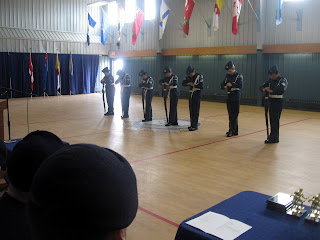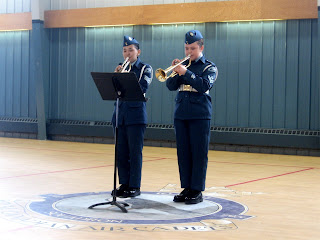The day had finally
arrived; Saturday, May 26, 2012. The
42nd Annual Ceremonial Review of 795 Iqaluit Squadron. An ACR parade is a year-end event designed to
showcase what the cadets of the squadron have learned throughout the regular
training year. Every squadron/corps in
Canada organizes an ACR of some kind for parents, friends, and visiting guests
before the beginning of summer. I have
participated in several ACRs when I was an army cadet but this would be my
first air cadet ACR as a civilian instructor.
The parade was scheduled to begin at 1300hrs (1pm) but
cadets & officers were required to be at the cadet hall for 0900 for setup
and practice. For setup, several areas
of the cadet hall needed to be prepared to host guests. Obviously, the drill hall was the first item
on the list. Cadets swept the parade
square with brooms, placed chairs along the wall where the podium was located,
and surrounded the perimeter with blue curtains. Officers setup the microphones and awards
tables. Many plaques and small trophies
would be handed out during the parade.
Next were the numerous static displays. The largest display was the CF-5 cockpit in
the storage garage next to the drill hall.
The commanding officer, Captain A. Chubbs had managed to save the large
aircraft piece from the scrap yard several years ago and it has been used as a
teaching aid ever since. Visiting guests
would be allowed to sit in the cockpits, safely assured that the ejection seats
were no longer operational.
The other static displays were located in the two
classrooms upstairs. Tables and chairs
had been moved to the walls to let people walk freely. After the parade, several cadets would sit
behind the displays and answer any questions from visitors. The displays showcased: the model rocketry,
biathlon, and fencing clubs; various air cadet uniforms & the air force
rank structure; and past & present photos of the squadron. The display I liked the most was the airport
diorama because it displayed models of various types of commercial
aircraft. The largest model is the
Airbus A380, the 'double-decker airplane' as I call it. The model was given to the squadron as a gift
when the aircraft was flown to Iqaluit in 2006 for cold weather tests. I was a mild model enthusiast when I was
growing up. Mild because I always had
trouble gluing the pieces together. Now
I just buy premade models.
The rest of the morning was devoted to parade rehearsals
& team practices. With the five team
demonstrations scheduled in the middle of the parade, the ceremony would last
around two hours. When it came time for
lunch, we all headed over to the Legion Hall next door. Even though I had been living in Iqaluit for
the last 4 months, I had yet to step into 'The Legion'. The Royal Canadian Legion Hall serves as a
restaurant, bar, and karaoke nightclub for members. And judging from the stories I've heard, it
seems that everyone in Iqaluit has a legion membership. On weekends, the establishment hosts a
morning brunch buffet and I have to admit that the food is quite good. There're various fruits, vegetables, fish,
meats, desserts, and drinks to sample.
Eating the prime roast beef reminded me of the brunch buffet at
Wilfrid's, an expensive restaurant at the Chateau Laurier in Ottawa.
After lunch, the cadets & officers returned to the unit
and changed into their uniforms. Parents, legion members, and guests began
arriving around 20 minutes before 1300 and took their seats in the drill hall. I would alternate between sitting and
standing because I wanted to document the event with photographs and short
videos.
The parade began with the falling in of the squadron and
marching on the Colour Party. Next came
the arrival of the Reviewing Party, consisting of the squadron's commanding
officer, guest reviewing officer, and legion representative. Every ACR has a guest reviewing officer and
the GRO this year was Lieutenant-Colonel D.P. Townsend. For the General Salute, a recording of the
national anthem was played over loudspeakers.
Lt.C. Townsend joined the Canadian Forces in 1985 and
graduated from Royal Roads Military College in Victoria, BC, in 1989, with
a BSc in Physics & Computer
Science. For the last 4 years, he has
been project director for the Chinook and Griffon helicopter fleets.
The cadets were inspected by Townsend, the squadron's
commanding officer (CO), Captain A. Chubbs, and the Legion president. The inspection only took a few minutes
because of the small size of the squadron (est. 25 cadets). Several of the younger cadets looked rather
nervous, having never been talked to by a high ranking officer. I have participated in parades where an
inspection can take up to 20 minutes.
Thankfully, there is a cadet band that plays several tunes to keep the
audience from falling asleep.
The inspection was followed by a march past. This drill movement requires the squadron to
march past the podium, giving an eyes-right to the reviewing officer. Cadets with parade positions are required to
salute. Although it may look odd in an
enclosed area, a march past is done as a form of respect.
It wouldn't be a military parade without speeches and
awards. Thankfully, there were only
three speeches and all of them were kept short.
The speakers were: Lt.C. Townsend, Cpt. Chubbs, and the president of the
Legion. In short, they each
congratulated the cadets for a well put together parade, and thanked the
parents for coming out to support their kids and the cadet movement. As for awards, there were a lot to give
out. Most of them were top cadet awards
in various categories. Several cadets
even received multiple awards.
The first demonstration was the drill team, exhibiting
proper standing & marching drill, and maintaining group discipline on
parade. Their finale included the use of
the .22 rifles. Next came the Colour
Party demonstration which was pretty much the same except the team had to march
with flags and rifles.
As for music, there were three demonstrations. One of my grade 10 clarinetists is learning
how to play the bagpipes in cadets. She
was asked by the CO to perform a few Irish tunes on the ACR and she accepted. For added assistance, her civilian
instructor, dressed in traditional Irish clothing, played along with her. They played 'Maple Leaf Forever' and
'Scotland The Brave'. Next came my two
senior trumpeters, Sgt Moss and Flight Corporal Niego-Akavak, who played two
classical pieces. And the last musical
demo of the parade was of course, the drums.
My three female drummers (two snares, one bass drum) marched out in a
line towards the centre of the parade square.
After halting and facing the audience, they began their short drum
feature. Despite a few mistakes, they
kept it together and received a round of applause at the end. As they marched off with grins on their
faces, I hoped their performance had
attracted new percussion recruits for next year.
One of the key cornerstones of the cadet program is the
promotion of physical fitness. The sports
team put on a short demonstration for the audience, showing them what kind of
sports the squadron engages. These
include: soccer, ultimate frisbee, and volleyball.
The last team demonstration was the fencing team. Fencing is a combat sport where opponents
duel with bladed weapons. The objective
is to score the most hit points by 'touching' your opponent with your sword. For safety, fencers wear all around
protective clothing. In cadets, the
choice of weapon is the foil, a light thrusting sword. With this blade, you can only score points
with the tip. For the demonstration, the
cadets displayed standing & attacking positions, and a typical fencing
duel.
With the demonstrations out of the way, the squadron
reformed on the parade square for the Advance In Review Order, General Salute,
and the Departure of the Reviewing Party.
For the General Salute, a recording of God Save The Queen was played
over loudspeakers. Before the Reviewing Party
departed, they enlisted the help of the audience to give the cadets on parade
one final applause. When the cadets were
dismissed, the festivities moved to the upstairs classrooms where the static
displays were located.
In my view, the ACR was a
success. I am proud of my trumpeters
& drummers for putting on well received performances. I was also impressed by the other team
demonstrations. The fencing demo got me
thinking about the time when I attended a summer fencing camp at Carleton
University when I was just a kid. Maybe
I should give fencing another try?















No comments:
Post a Comment